THE BULBUL OF INDIA...BHARAT KOKILA SAROJINI NAIDU!
We have all grown up reading about Sarojini Naidu in our history classes and read some of her poems which were included in the English language curriculum.
I still remember her poem "The bangle sellers" which we studied in ICSE and how beautifully our teacher, Mrs. Pandit explained it to us. The poem revolves around the bangles & explores the culture, tradition & lives of Indian women. Her poems were rich in imagery.
As T.S. Eliot said " Poetry is not the turning loose of emotion but an escape from emotion, it is not an expression of personality but an escape from personality. But, of course, only those who have personality and emotions know what it means to want to escape from these things".
The charismatic personality of Sarojini Naidu is evident in her myriad roles as a political activist, feminist, poet, and the first Indian woman to be president of the Indian National Congress in 1927 and to be appointed a governor of United provinces or present day Uttar Pradesh after the Indian independence in 1947.
She was called “the Nightingale of India" or Bharat kokila by Mahatma Gandhi.
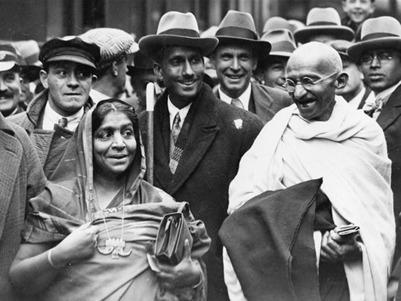
Her poem "The Gift of India" reflects Sarojini’s love for her country.
In 1917, she helped found the Women’s India Association with the need to involve more women in the struggle for freedom.
Sarojini Naidu's first guru was Gopal Krishna Gokhale who had encouraged her to fight for the country.
He had once told her at Caxton Hall, London "Stand here with me with stars and hills and witness and in their presence consecrate your life and your talent, your song and your speech, your thought and your breath, to the motherland."
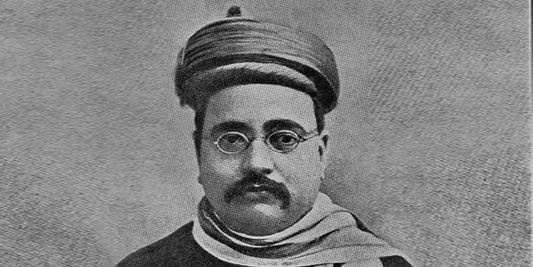
It was Gokhale again who spoke to her of Gandhiji as the "coming man of Indian politics" and prepared her for continuing her apprenticeship under Gandhiji.
Sarojini Naidu, who spoke Urdu, Telugu, Bengali, Persian, and English, began writing poetry early. Known as a child prodigy & a brilliant student, Sarojini joined the University of Madras at the age of 12 where she won a scholarship & went on to study at King's College in London and later at Cambridge University where she had the opportunity to meet prominent English authors like Arthur Simon and Edmond Gosse who inspired her to write on themes relevant to India.
They advised Sarojini "To be a genuine Indian poet of Deccan, not a clever machine-made imitator of the English classics" which led her to seek inspiration from India’s natural beauty, religious pluralism and the essence of the country’s social milieu.
She was also listed among the "150 Leading Women" list by the University of London to mark the 150 years since women gained access to higher education in the United Kingdom in 2018.
Sarojini met Muthyala Govindarajulu Naidu, a South Indian, non-Brahmin physician while she was studying in England and fell in love. After returning to India, she married him at the age of 19. They were married by the Brahmo Marriage Act (1872), in Madras in 1898. The marriage took place at a time when inter-caste marriages were not allowed and tolerated in India.
The Nightingale of India, Sarojini Naidu was a prolific writer and poet. The first volume of her poetry " The Golden Threshold" was published in 1905 after which The bird of time & broken wings were published. She also wrote a biography of Muhammad Ali Jinnah entitled The Ambassador of Hindu-Muslim Unity.
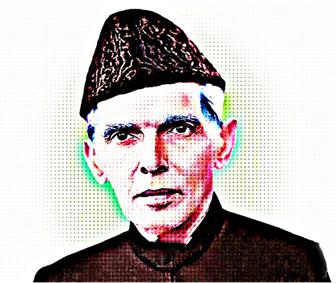
Muhammad Ali Jinnah
In 1906, Sarojini Naidu attended the Indian National conference where gently but in no uncertain terms she told the delegates that she would participate in the National Conference only if her amendment was adopted. She had boldly suggested a change from the word ' Hindu' to 'Indian'. To Sarojini Naidu, who was intensely patriotic and steeped in a culture that was a harmonious mix of the best features of a tolerant Hinduism and a catholic and liberal Islam, only the word 'Indian' was acceptable.
With the introduction of the Rowlett Act in 1919, Sarojini joined the Non-Cooperation Movement organized and led by Mahatma Gandhi.
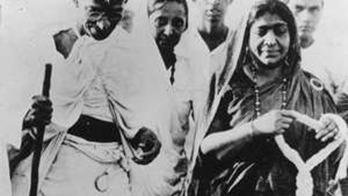
Her relationship with Gandhi was that of mutual respect as well as of benign humour. She famously called Gandhi ‘Mickey Mouse’ and quipped "It costs a lot to keep Gandhi poor!”
Sarojini described her momentous first meeting with Gandhiji thus: "Curiously enough, my first meeting with Mahatma Gandhi took place in London on the eve of the Great European War of 1914. When he arrived fresh from his triumphs in South Africa, where he had initiated his principle of passive resistance and won a victory for his countrymen who were at the time chiefly indentured labourers, over the redoubtable General Smuts, I had not been able to meet his ship on arrival. But the next afternoon, I went wandering around in search of his lodging in an obscure part of Kensington and climbed up the steep stairs of an old, unfashionable house, to find an open door framing a living picture of a little man with a shaven head seated on the floor on a blank prison blow. Around him were ranged some battered tine of parched ground-nut and tasteless biscuits of dried plantain flour. I burst instinctively into happy laughter at the amusing unexpected vision of a famous leader, whose name had already become a household word in our country.
"He lifted his eyes and laughed back at me saying: 'Ah, you must be Mrs. Naidu! Who else dare be so irreverent. 'Come in, 'he said, 'and share my meal'. 'No thanks. I replied, sniffing, 'what an abominable mess it is'.
"In this way and at that instant, commenced our friendship, which flowered into real comradeship, and bore fruit in a long. long, loyal discipleship, which never wavered for a single hour through more than thirty years of common service in the of India's freedom from foreign rule."
As Smt. Padmini Sen Gupta in her biography of Sarojini Naidu has written, "This first meeting in London was a red-letter day, an event which changed the whole course of Sarojini Naidu's life, which took her away from the honeyed drawing rooms of scholars and poets and placed her before a beggar-saint.
From then on, with his magnetism, he claimed almost her whole attention".
Sarojini Naidu never forgot this first meeting and referred to it again and again. On October 2, 1947,-the occasion of Mahatma Gandhi's 78th Birthday - the last Gandhi-Jayanti during his life-time - she again recalled this dramatic unplanned first, meeting in London and added, "And so, laughingly, we began a friendship that has lasted, grown, developed through all these many years.
The relationship between Gandhiji & Sarojini Naidu blossomed into that of an ideal Master and disciple with scintillating repartees, totally free unselfish, and transparent, as both were endowed with great wit and wisdom. Sarojini could tease the Mahatma, joke about him but she held him in utmost reverence. She had started by calling him "friend" and ended up thinking of him as "father".
She once said about Mahatma Gandhi in his presence that "he looked exactly like a bat" as has been quoted by H. N. Brailsford in one of his write-ups on Sarojini Naidu in Hindustan Review entitled "Sarojini Naidu, A Great Human Being" a special Sarojini Naidu supplement in April 1949, a month after her death on March 2, 1949.
Sarojini enjoyed a friendly relationship with Nehru. In 1939, Nehru received a touching letter from India’s poet-nightingale, Sarojini Naidu.
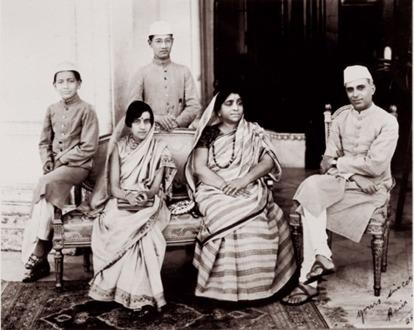
She addressed herself as his “poet sister and fellow seeker” and wrote that Nehru was “a man of destiny born to be alone in the midst of crowds, deeply loved, but little understood.” The letter concludes by expressing her belief that Nehru will transmute “the predestined gifts of his life, that of sorrow, sacrifice and strife”, into “the very substance of ecstasy and victory.”
Sarojini referred to Nehru as her "beloved brother" & once cautioned him not to be carried away or influenced in his judgements by flatterers and time-servers: "Don't be taken in by these pretty young women's interest in socialism. They have all got their eyes on your handsome looks, not in your ideology!"
When she died, Pandit Nehru paid her handsome tribute like the one who "infused artistry and poetry into the national struggle" She got along famously with Jinnah especially in 1910, during the time Jinnah was prominent in both congress & the Muslim league.
In 1918 she contributed an introduction to a collection of his speeches, in which she describes him as: ‘Somewhat formal and fastidious, and a little aloof and imperious of manner, the calm hauteur of his accustomed reserve but masks, for those who know him, a naïve and eager humanity, an intuition quick and tender as a woman’s, a humour guy and winning as child’s, a shy and splendid idealism which is of the very essence of the man.’
One of Sarojini Naidu's poems, The Call to Evening Prayer, shows "her belief in the sacredness of all religions."
Even under the most unfavourable situation, she would never lose track of her friendship with Jinnah.
Sir C.P Ramaswamy Aiyar, a great name in the political history of India, narrates a very interesting incident in this regard.
Once, in 1946, he went to see Ms. Naidu and told her about a book he had written "Some Great Leaders".
Immediately she asked him if he had included Jinnah and when the answer was negative, she was angry with him and said, "But Jinnah is a great man. You should have included him in your book."
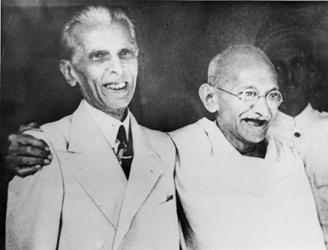
She held people of worth belonging to any religion, caste, creed-gender, Indian, or Westerner equally in high esteem with an open mind.
She was awarded the Kaiser-i-Hind medal by the British government for her work during the plague epidemic in India She returned the award as a protest after the Jalianwalla Bagh massacre.
Aldous Huxley met her in Bombay and remarked: a woman who combines in the most remarkable way great intellectual power with charm, sweetness with courageous energy, a wide culture with originality and earnestness with humour. If all Indian politicians are like Mrs. Naidu, then the country is fortunate indeed”.
She lived her glorious life by her own words, “As long as I have life, as long as blood flows through this arm of mine, I shall not leave the cause of freedom. I am only a woman, only a poet. But as a woman, I give to you the weapons of faith and courage and the shield of fortitude. And as a poet, I fling out the banner of song and sound, the bugle call to battle. How shall I kindle the flame which shall waken you men from slavery?
A discerning foreign analyst had written of our freedom struggle, "Gandhi gave the Congress inspiration, Jawaharial broadened its vision and imagination, Rajagopalachari sharpened its intellect and analytical faculty, Rajendra Prasad gave it purity, Vallabhbhai Patel gave it efficiency, a sense of thoroughness and power and Sarojini Naidu gave it GRACE".
